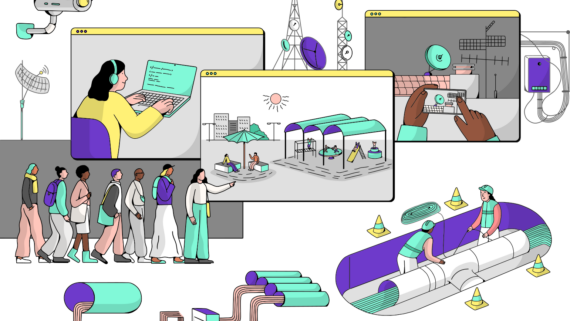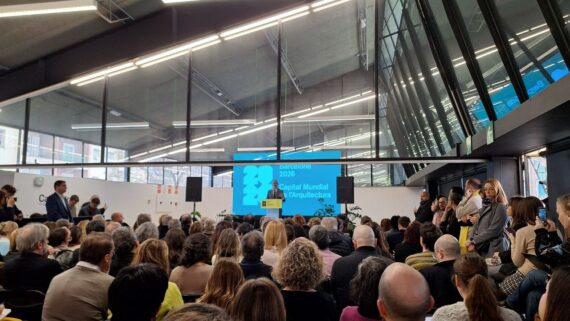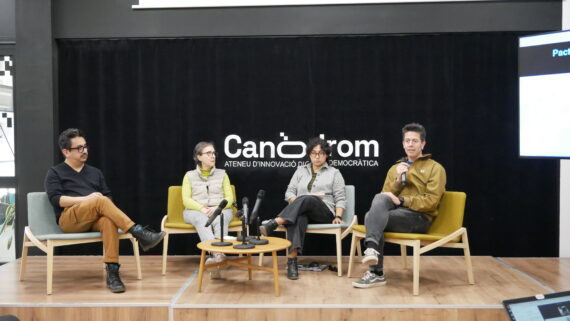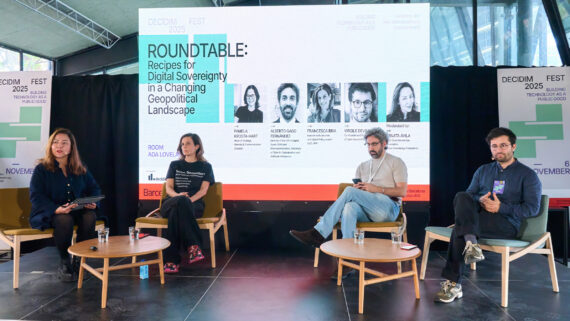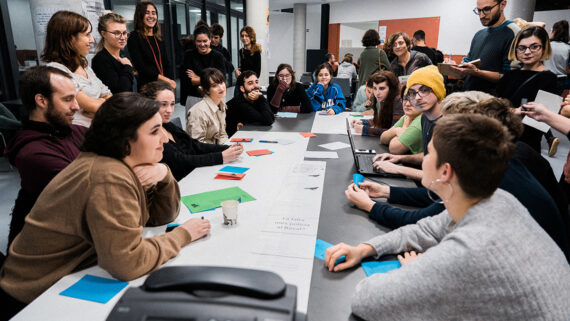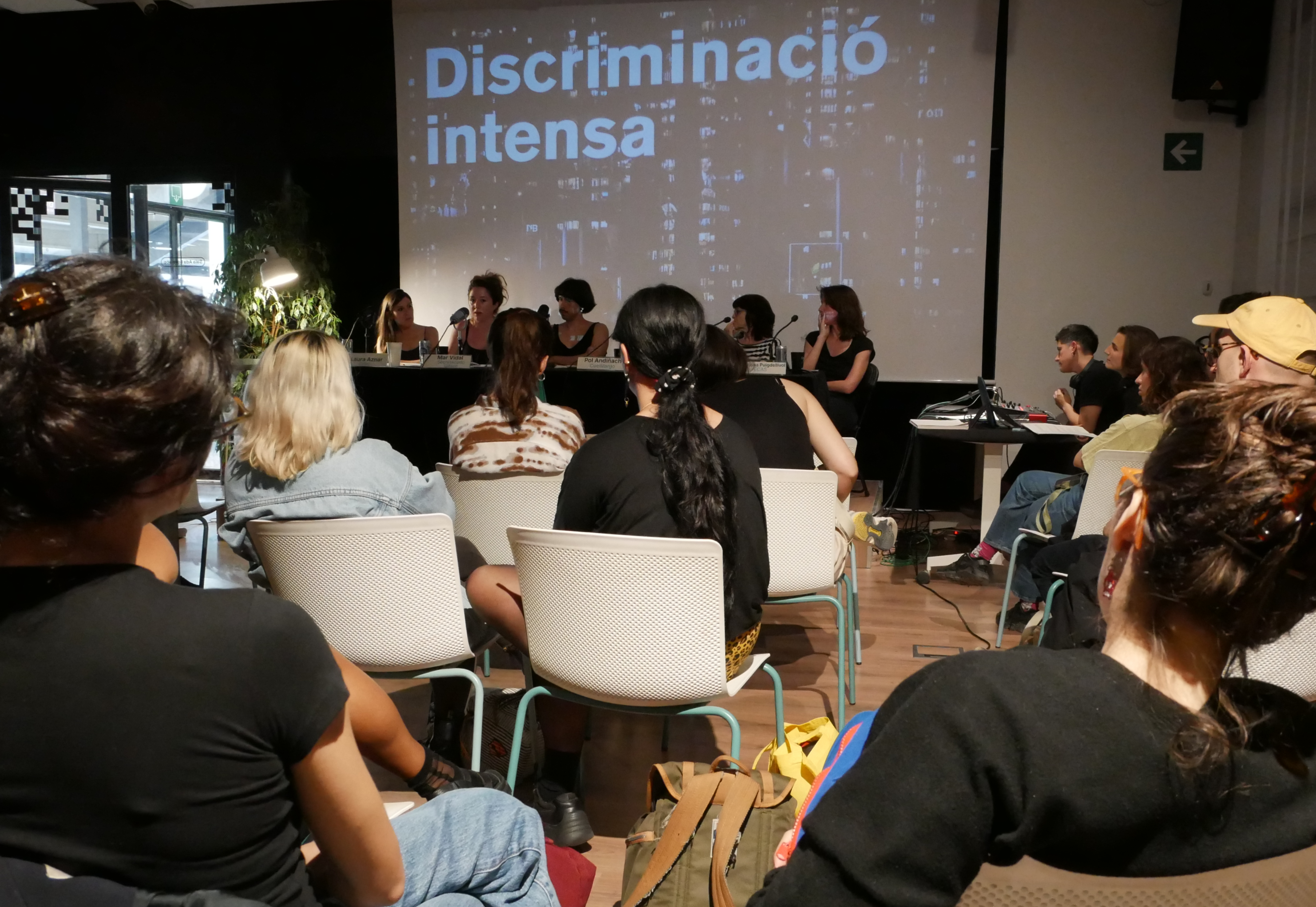
The microphones at Canòdrom were turned on with the first live episode of Radio Canòdrom. The air was filled with an intimate and necessary conversation about aporophobia and its extended shadow over the foundations of homes.
With the purpose of combating social exclusion, media hegemony and the growing presence of hate speech on networks socials, the live podcast "A collective home" generated a space for experimentation to promote coexistence, empathy and respect in the face of social inequalities.
Last May 24, six voices met at Radio Canòdrom to shape a choral story around the multiple impacts of poverty materialized through the basic idea of home: Pol Andiñach analyzes on the channel cuellilargo hate speech in the digital sphere; Samu Céspedes is a non-binary artist, home worker and member of Sindillar; Mar Vidal accompanies vulnerable people from Secretariado Gitano and ECAS; and Mariona Puigdellívol, general director of ECAS and Montse Santolino, coordinator of LaFede.cat are part of organizations that work for international cooperation, peace and human rights.
A podcast led by Laura Aznar Llucià, journalist of CRÍTIC and collaborator of TV3 and RAC1. The music was accompanied by
The music was accompanied by DJ TUTU, pseudonym of Gemma Planell, who sets the soundtrack with her own way of telling stories. As a visual complement, the figure highlighted in the contemporary artistic scene, Carlos Carbonell, specialized in collaborative art and artificial intelligence, brought a unique visual dimension to this experience.
"The Home of Absences" at ECAS
Mar Vidal, spokesperson for the Gypsy Secretariat and ECAS, started the program by opening the window of the houses with "The Home of Absences", an exhibition that reveals the absence of essential things like a clock, a radiator, a laptop, all symbolizing the deprivations experienced by people who are in a situation of poverty. "The 31.1% of the Catalan population cannot cope with unforeseen expenses: the repair of a computer, going to the dentist..." We were able to enjoy it from May 24 to June 7 at Canòdrom.
The exhibition recreates a simplified living room, and as we visit it we find broken objects, split in half, that represent different dimensions of poverty, because the life of the people in vulnerable situations is marked precisely by these elements, or rather, precisely, by their absence. They are the situations of poverty of people and families who, for example, despite having a roof and a job, find themselves in this situation of risk, in this border between exclusion and inclusion that can go unnoticed, of which often biased analyzes are made, because, if you have a job, if you have a house, why are you poor?
These realities affect the 25% of the population in Catalonia, which is 1 in 4 people, and that's what ECAS denounces. The right to housing, income guarantee policies and investment in social policies are key to be able to face this situation of structural inequalities.
Working conditions in the Household sector
Samu Céspedes, from Sindillar, spoke about the precarious working conditions suffered by the home and care sector, where the majority of workers are migrant people. He described the scenario as a daily struggle against marginalization and oblivion.
In Barcelona, more than 34,000 people are dedicated to home and care work. This sector becomes a main entry door to the subsistence labor market for many migrants who arrive in the State, especially women, according to data from the UGT union, which places the figure at 60%. "The home can also be a space where rights are violated. From the union we denounce the working conditions that border on slavery," explains Céspedes. While they are exposed to multiple abuses, these workers become a fundamental piece of the care provision system
care provision system to people in a situation of dependency.
At the union of home workers, Sindillar/Sindihogar, they have been denouncing this situation for years and fighting for the State to ratify Convention 189 of the International Labor Organization. Their special contribution regime to Social Security does not give them right to unemployment subsidy and allows those who employ them to unilaterally terminate the employment contract without having to justify any cause for dismissal.
Since its birth, in November 2011, Sindillar works for the autonomy and empowerment of home workers through activities designed and executed by the same affiliates. "We are aware that there is a narrative that is fortified from the media, that migrant people are a burden for the State. We find it important to point out the wealth we bring and the consequences of the lack of a universal public care system."
Iframe is not supported in your browser.
Hate Speech and Algorithms
How is poverty portrayed from the window of social networks? Pol Andiñach, from cuellilargo, and Montse Santolino, from LaFede.cat, opened the digital window to expose how hate speech is magnified by algorithms online, fueling the flames of inequality and oppression.
"On social networks we see with alarm and perplexity how hate speech is spread with the complicity of the platforms themselves, which have very clear interests.", explains cuellilargo. These digital spaces are not neutral and hate speech takes the form of contempt, rejection and discrimination against people migrants, racialized, the women, the LGTBIQ+ collective and all those in a situation of vulnerability. It is content that gives many visits and money and sometimes is suggested by the algorithms of these tools and, for them, the aporophobia is filtered through all the corners. In this context, "the anti-tax discourses and in favor of the dismantling of public services flood visits to the ultracapitalist and neoliberal profiles that reach millions of users, among them many young people."
From the window of LaFede.cat, an organization that works for global justice, Montse Santolino explains that these discourses increase on social networks. In the case of racialized people, SOS Racism has established three different hate narratives: that they take advantage of taxes and aids, that they are a threat and that they are inferior. "The Spanish Observatory against Racism and Xenophobia says that 60% of digital hate is against African people who profess Islam." The problem, for Santolino, is that hate speech does not stay on social networks, but ends up turning into real aggressions. In Catalonia, in 2023 there were 200 complaints for reasons of hate on social networks, especially against LGTBIQ+ and racialized people.
Iframe is not supported in your browser.
The collective home on the street and in social struggles
Common spaces are the spaces for the defense of rights and the defense of the welfare state. What strengths and difficulties do we detect? Mariona Puigdellívol, director of ECAS, reflected on a welfare state that is not up to its promises, highlighting the unequal increase in social budgets compared to the growing need for social rights such as decent housing and social assistance.
"Social services are not understood as a right of all citizens and this makes the citizens themselves do not demand them as part of the welfare state. Here intersect the discourses that promote hate and not the bond between people.", explains Puigdellívol.
What happens when the welfare state does not exercise this role or activates mechanisms to exercise social control against the most vulnerable people? From LaFede.cat, Santolino explains that two battle horses are the cameras of facial recognition in public space and the automated systems used by some public administrations and that affect fundamental rights without human control or supervision. "Who designs the algorithms are companies and when they invite someone to supervise them, they only include engineers, not the people and communities affected."
Iframe is not supported in your browser.
A call to struggle and collective action
The program concluded with a call to collective action and self-organization, underlining that only through human bonds and community empowerment can we challenge the barriers of inequality and social indifference.
"The promotion of bonds is the most important, generate proposals for debate and dialogue, like this radio space. We must also be able to support movements and people who self-organize to defend their rights.", explained Puigdellívol.

